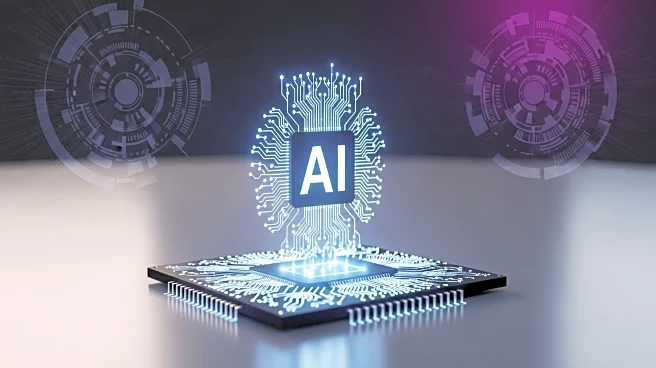What is the story about?
What's Happening?
Goldman Sachs Group Inc. Chief Executive David Solomon has articulated a vision where artificial intelligence (AI) will expand the bank's workforce rather than reduce it. Speaking at a conference in Italy, Solomon emphasized that while AI will automate certain tasks, it will also create new opportunities requiring human talent, potentially increasing the bank's headcount over the next decade. This perspective contrasts with industry fears of AI-driven layoffs, as Solomon argues that technological advancements evolve organizations rather than shrink them. Goldman Sachs plans to heavily invest in AI to enhance operations, including risk assessment and client services, which Solomon believes will lead to more sophisticated projects and specialized roles in data science, ethics oversight, and AI integration.
Why It's Important?
Solomon's stance on AI represents a significant shift in how Wall Street might approach technological advancements. By viewing AI as a growth engine rather than a cost-cutter, Goldman Sachs positions itself as a leader in adapting to technological changes. This approach could influence other financial institutions to reconsider their strategies regarding AI and workforce management. Solomon's comments also highlight the potential for AI to drive economic momentum through infrastructure buildouts, which could have broader implications for U.S. economic growth. His caution against over-enthusiasm in AI investments, drawing parallels to the dot-com bubble, suggests a balanced approach to technology spending, which could impact investor sentiment and market dynamics.
What's Next?
Goldman Sachs plans to continue its investment in AI, with Solomon indicating a willingness to allocate up to $8 billion annually to tech innovations if budgets allow. This commitment to technology spending underscores the bank's strategy to remain competitive and adapt to evolving market conditions. As AI applications expand in core functions like analyst work and IPO processes, Goldman Sachs may require more personnel to manage increased volume and complexity. Industry watchers will be monitoring whether Solomon's optimistic vision of AI as a workforce expander materializes, especially as market corrections loom and AI investments face scrutiny.
Beyond the Headlines
Solomon's vision of AI as a workforce expander rather than a reducer challenges dystopian narratives about technology's impact on employment. His approach suggests a future where human-AI synergy could boost employment, with machines handling routine tasks and humans focusing on strategic roles. This perspective offers a refreshing antidote to fears of widespread job losses due to automation, positioning Goldman Sachs as a bellwether for how banks might adapt to technological advancements.















